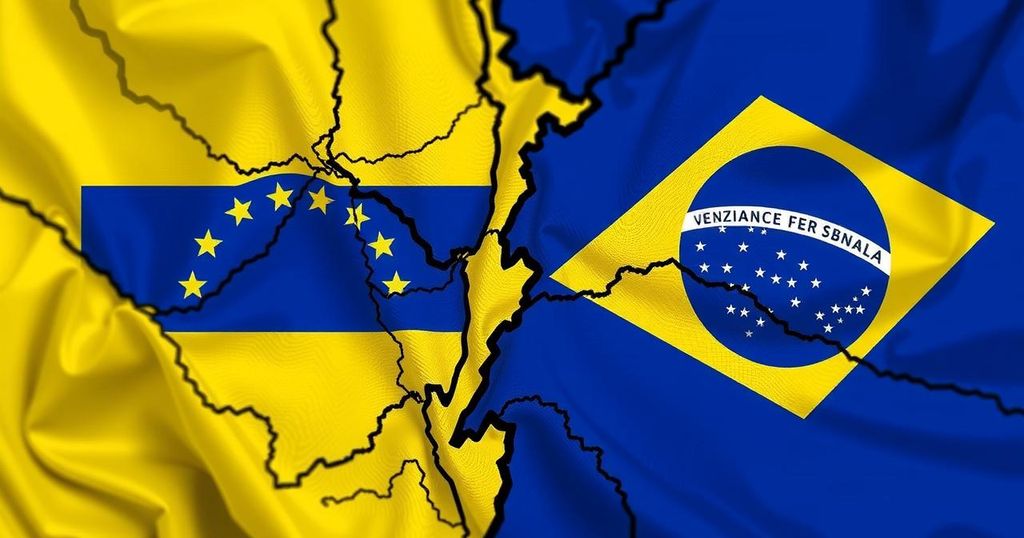Venezuela has reacted with fury to Brazil’s veto of its admission to the Brics group, calling it an “immoral aggression.” Relations between the two nations have deteriorated following Venezuela’s disputed elections, with Brazil’s President Lula expressing skepticism over the electoral process. Russian President Putin acknowledged Venezuela’s position while noting that membership requires consensus within Brics. This tension underscores the challenges of unity within the Brics coalition given global political complexities.
Venezuela has expressed strong dissatisfaction regarding Brazil’s recent decision to veto its entry into the Brics coalition of emerging economies. The Venezuelan foreign ministry characterized this action, which took place at a summit in Russia featuring over 20 national leaders, as an “immoral aggression.” Relations between the two countries, which are governed by leftist administrations, have soured following the contentious presidential elections in Venezuela last July. President Nicolás Maduro has claimed his own re-election, despite widespread evidence suggesting that the opposition candidate, Edmundo González, won decisively. Brazilian President Luiz Inácio Lula da Silva initially demonstrated support for Maduro but later indicated he would wait for a detailed electoral breakdown before recognizing the results, reflecting the skepticism of many foreign governments about the election’s legitimacy. The Venezuelan government has further condemned Brazil’s foreign ministry for maintaining the veto originally imposed by former Brazilian president Jair Bolsonaro, asserting that such actions perpetuate a culture of hatred and exclusion. A statement from Venezuela’s foreign ministry articulated the sentiments of its people, expressing feelings of indignation and shame over what they perceive as an unjust aggression. Venezuela had made extensive efforts to join the Brics alliance, with President Maduro even attending the Kazan summit to declare his nation’s belonging to the Brics community. Russian President Vladimir Putin, who hosted the summit, acknowledged Venezuela’s stance but emphasized that membership depends on the consensus of current Brics members. He noted, “We know Brazil’s position. We don’t agree, Venezuela is fighting for its survival,” highlighting the geopolitical sensitivities at play. Lula had intended to attend the summit but canceled due to an injury prior to the event. Putin has expressed his desire to facilitate improved relations between Brazil and Venezuela. The Brics coalition, which initially included Brazil, Russia, India, China, and South Africa, has expanded to welcome new members like Egypt and Iran. Lula advocates for Brics as a mechanism for reforming global governance and amplifying the voices of developing nations, critiquing the paralysis of current global institutions. However, critics argue that internal disparities within the Brics, notably Russia’s ongoing conflict in Ukraine and the tensions between China and India, may render the group itself ineffective. The recent Kazan summit served as a platform for President Putin to assert that Russia remains resilient against international isolation but also illuminated the deepening rifts between Brazil and Venezuela following Lula’s re-election.
The Brics group emerged as an influential platform uniting key emerging economies, specifically Brazil, Russia, India, China, and South Africa. Its purpose is to create a counterbalance to Western dominance in global affairs. In the past year, the coalition has expanded to include countries like Egypt and Iran, reflecting its growing significance. However, recent political dynamics between Brazil and Venezuela, particularly following Venezuela’s disputed election results, have complicated the relationship between these two nations. International views on the legitimacy of Venezuela’s elections contribute to tensions, as many foreign governments recognize the opposition’s claims of victory, creating a rift within South American politics.
In conclusion, Venezuela’s rejection from the Brics grouping has led to significant diplomatic fallout with Brazil, demonstrating the complexities of international relations among emerging economies. The political climate following Venezuela’s contentious elections continues to hamper relations between the two nations, as they navigate historical and ideological differences. President Putin’s attempts to mediate the situation emphasize the broader geopolitical implications inherent in this diplomatic spat and highlight the ongoing struggles within the Brics alliance itself.
Original Source: www.bbc.com







